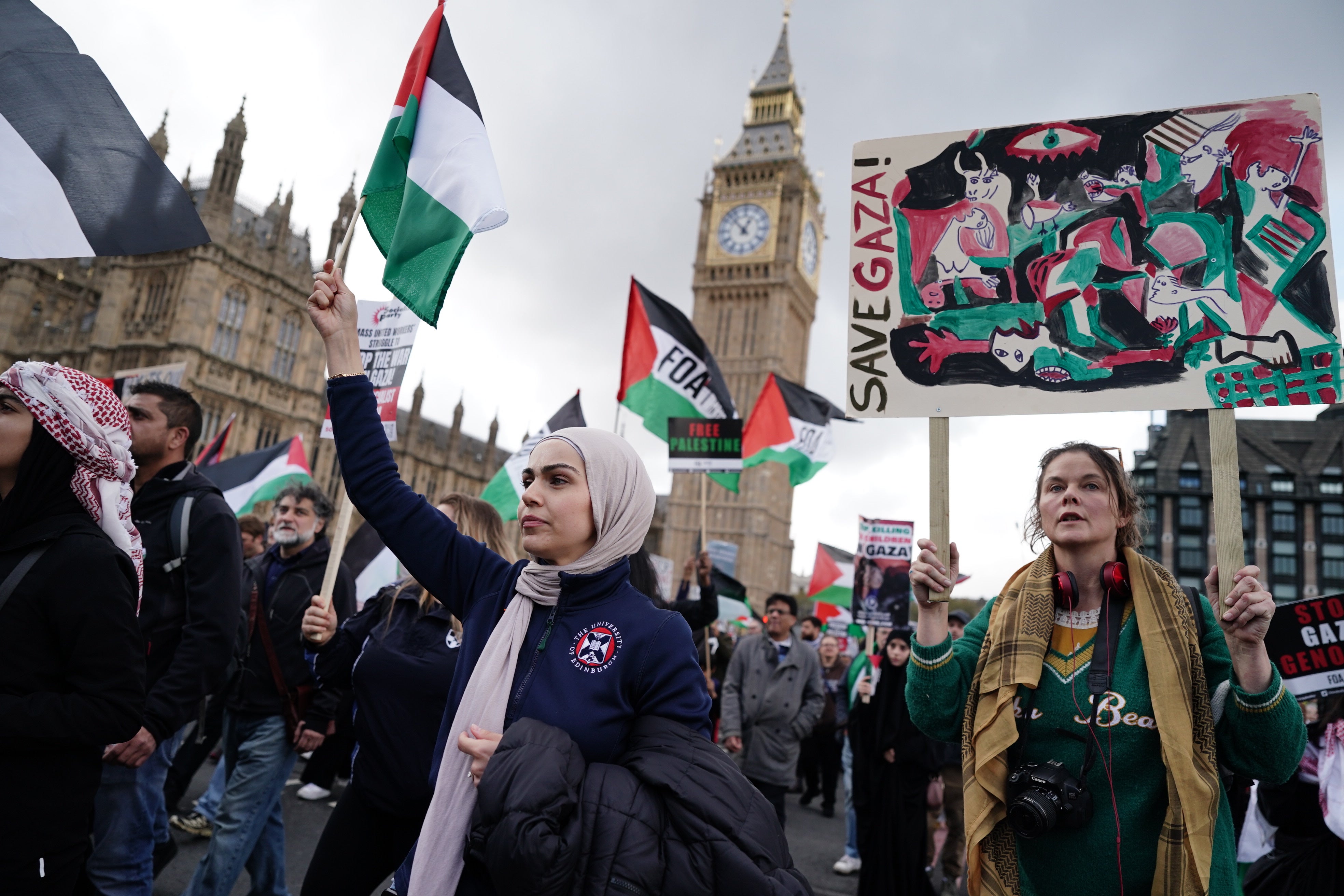Hamas attack was a ‘Kristallnacht’ Nazi-style massacre – that is why British Jews are in fear
Demonstrators at the latest pro-Palestinian rally in Parliament Square started a new chant, one calling for an intifada ‘from London to Gaza’. As the UK sees a sharp rise in antisemitic attacks, can ordinary Jewish people ever feel safe, asks Mark Honigsbaum

Last week, I signed up for a rally at Scotland Yard called by the Campaign Against Antisemitism. I am not the sort of person – perhaps I should write, “the sort of Jew” – who usually attends rallies or considers himself a target for antisemitism. I do not own a kippa or celebrate Jewish holidays. And though my features are vaguely semitic, I am often mistaken for an Italian or, when people learn my name, a German.
However, with pro-Palestinian demonstrators calling for “jihad” on the streets of London and comparing Israel’s response to Hamas’ attack to “genocide”, I felt it was time to stand up and be counted. Through sheer indolence, I am ashamed to say, I stayed at home.
That was a mistake. Despite the Met’s pledge it would no longer tolerate antisemitic chants by pro-Palestinian protestors on the streets of the capital, at Saturday’s rally in central London – the third demonstration in as many weeks – police made just nine arrests. Meanwhile, chants of “From London to Gaza, we will have an intifada” went unpunished.
As the CAS points out, past intifadas were campaigns of violence that included suicide bombings. If this is not a call for terrorism and an example of unlawful speech, I do not what is.
Since then, the news for Jews has only got grimmer. Over the weekend, an antisemitic mob surrounded a flight from Tel Aviv at Makhachkala airport in Dagestan, a Russian republic with a large Muslim population, before rampaging through the airport in search of Jewish passengers.
And in case you think Dagestan is sufficiently far away from the UK for it not to matter, last week the Community Security Trust (CST), an organisation which aims to promote good relations between British Jews and British society, reported that antisemitic attacks have increased fourteenfold since Hamas murdered 1,400 kibbutzim and international festival-goers in southern Israel on October 7.
In the past three weeks, the CST has recorded 805 antisemitic incidents across the UK, the highest total since it began keeping records in 1984. These incidents not only included the usual defacement of Jewish property and the offensive daubing of swastikas over the Star of David, but physical attacks laced with the rhetoric and iconography of the pro-Palestinian protests.
I hold no candle for Israel, a country I have never visited, much less Benjamin Netanyahu and his Likud party – a party that until recently seemed set on dismantling the constitutional checks and balances that once made Israel a beacon for democracy in the Middle East.
Nor do I think that Hamas’ vicious pre-meditated attack – the worst atrocity against Jews since the Holocaust – warrants the indiscriminate bombing by Israel of innocent Gazan men, women and children.
More pertinently, what has any of this got to do with British Jews – and why should we be held accountable for Israel’s asymmetrical response?
Though I was raised agnostic and have raised my children the same way, as I read about Jewish parents’ instructing their teenage children to conceal their stars of David on nights out in central London, I began for the first time to fear for my own safety and those of my children. These anxieties were not helped by my son jetting off to Morocco on a surfing trip as news broke of the horrifying scenes in Makhachkala airport.
For me, the conflict in Gaza came home on the very first day of what would soon become a war when I saw a tweet from the Countdown presenter Rachel Riley, showing men dancing and waving Palestinian flags minutes from my home in Acton, west London.
Riley’s tweet was date-stamped 7.55pm on October 7. The Israeli Defence Force had barely begun its retaliation but already, it seemed, some people were rallying around the terrorists.
Later, I learned the celebrants had gathered in front of one of my favourite cafés, Pista Honey, on Acton High Street. Apparently, several passers-by had honked their horns in sympathy and later someone had launched a volley of fireworks.
Such mindlessness might be expected from local youths raised on decades of anti-Zionist propaganda. But others appeared to exhibit insensitivity when confronted with evidence of Israeli children mutilated in cold blood by Hamas, an organisation whose charter explicitly calls for the destruction of the state of Israel. I was not prepared for that.
I believe that the protesters marching in London are, by and large, good people – the sort of people who would not hesitate to show sympathy for other discriminated-against minorities. But for some reason, when it comes to Israel and Jews, sometimes emotions run cold. Instead, we are treated to lectures about the Balfour Declaration, the importance of “context” and accepting that Israel is a colonialist “settler state”.
The effect is both depressing and chilling. With protesters promising further pro-Palestinian rallies against Israel in London, it is hard to shake the feeling that October 7 was our Kristallnacht – and that the only people we can count on going forward are ourselves.
Mark Honigsbaum is a medical historian and senior lecturer in journalism at City, University of London
This article was amended on 1 November 2023. It originally said that the IDF had yet to fire a round in retaliation when Ms Riley tweeted on the evening of 7 October, but retaliatory action had begun earlier that day.






Join our commenting forum
Join thought-provoking conversations, follow other Independent readers and see their replies
Comments